If there ever was a moment that Herbie Kuhn heard the audible voice of God, it was on a basketball court. Not the Scotiabank Arena, sitting courtside to announce the Toronto Raptors, for whom Kuhn has been official game announcer since 1995, but inside a much smaller arena in Pickering, Ont.
He’d been invited to inspire a youth basketball camp in 1998 by Athletes in Action Canada, a Christian sports ministry dedicated to creating “the total athlete” — one who is fit physically, socially, mentally and spiritually. “If you’re weak in any one of those,” Kuhn explains to me over Zoom, “you are going to weigh on your performance.”
You may unsubscribe from any of our newsletters at any time.
Kuhn can say this as confidently as any gospel today, but not so almost a quarter century ago in Pickering. Kuhn had tried to turn down the opportunity to speak to a room of players, parents and camp supervisors celebrating the season’s end. “At this point, I’ve announced for Michael Jordan, the Chicago Bulls. I’ve announced at world championships, Olympic qualifiers. I’ve announced to groups of 50,000 people,” says Kuhn, 53, shaking his head at his younger self. “And I’m scared to go preach God’s word in front of 70 people. Why?”
It was completely new territory for Kuhn. Despite being raised by a deeply spiritual, church-going Caribbean woman, he had only recently come to think of himself as a Christian. Kuhn was still discovering his transformation — as a sports professional, new husband and child of Christ — and he didn’t feel ready to speak about his religious journey.
“This is a step of faith,” he recalls the Athletes in Action co-ordinator saying. “You need to do this.” To the boys and girls of the camp, Kuhn wasn’t simply the voice of the Raptors — he was an insider, a witness to the possibility of young people like themselves one day playing the tipoff in a pro-basketball team jersey. The co-ordinator tried to make it sound simple: “Pick a favourite verse and tell them what Jesus has done in your life.”
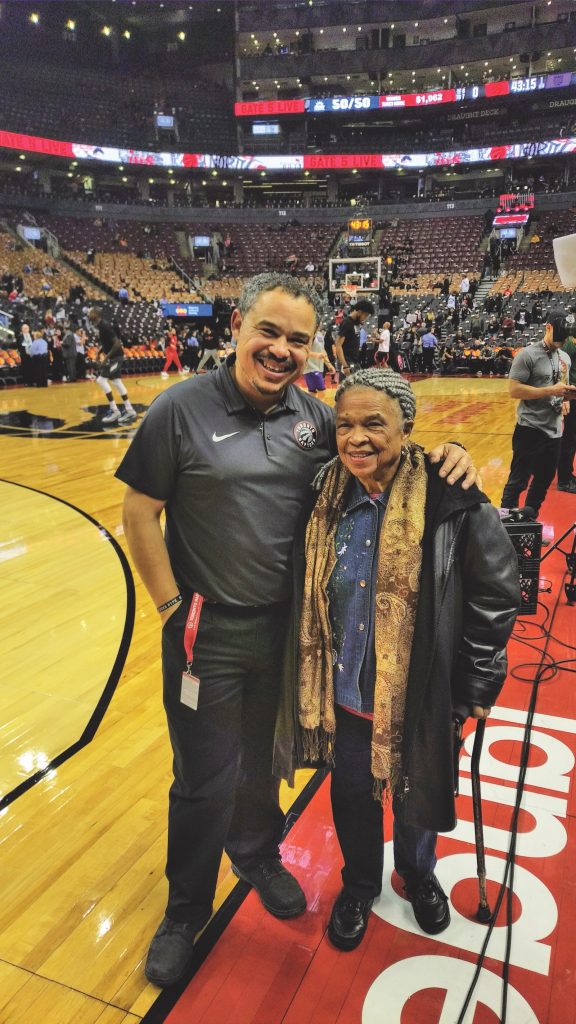
And so he did. Kuhn told them about how he used to live his life, and how things changed when he chose to be a Christian. As he described to me last spring, he once yearned to be the life of the party, his thirst for beer, cigarettes and popularity often clouding his judgment and leaving him with nothing more than a hangover and coughing fits. But he discovered the power of his own voice in his early 20s and, more importantly, his belief that God gave him that gift so that he had something to lose if he continued down a spiritless path.
In Pickering that day, Kuhn punctuated the beats of his journey with Philippians 4:13. By the end of his pep talk, the room was on its feet cheering as he shouted the verse: “I can do all things. I can do all things through Christ. Through Christ, who strengthens me.”
“I looked up at the gym ceiling rafters — basketballs stuck in the roof — turned my back to the people there, and I looked up at God and said, ‘We’ve stumbled on something here, haven’t we?’”
And that’s when he heard it — the mumble of God. “Uh huh.”
“That was my epiphany,” says Kuhn, recalling the story with a grin big as the Cheshire Cat’s. From that morning forward, Kuhn’s voice had a second purpose. The public address (PA) announcer would soon serve as a team chaplain for the Raptors and later the Toronto Argonauts. Over the course of his career, his natural gift for speaking has helped guide countless young athletes through the unique spiritual struggles of professional sports. It’s also helped him find his bearings in times of confusion, whether navigating his complex mixed-race identity or realizing meaning in hardship.
Kuhn sits in a crowded office late last April in his basement, dressed for an eight-kilometre run the moment our virtual meeting will end. This run will be his 353rd in as many days. Never one to waste a setback, he took up the daily exercise in the pandemic, shedding 50 pounds from a near-peak weight of 235. From the looks of it, Kuhn is faring well for a sports professional during one of the strangest times for the industry.
It’s been eight months since the Canadian Football League (CFL) cancelled the 2020 season and over a year since the National Basketball Association (NBA) suspended theirs in spectacular fashion. The NBA returned four months later within an isolation zone created at Disney World with minimal personnel. Kuhn and other non-core staff didn’t join the players in the bubble, nor did he join them the following season in Tampa Bay, Fla., where the Raptors played to work around Canada’s COVID-19 travel restrictions.
All that disruption has quieted Kuhn’s booming voice and ultimately transformed most of his sermons into private conversations with players via phone and text. He cherishes how this has personalized his services, but he longs for the energy of a pre-game preach and the adrenaline of juggling his duties. Some days during a regular season, Kuhn would hold a Bible study after an Argos practice at BMO Field, then hurry across Old Toronto to set up chapel services in a curtained-off hallway of Scotiabank Arena, lead a short devotional and prayer with a handful of Raptors and the occasional player from the opposing team, then race to the PA system within two minutes of saying “Amen.” “I really, really missed it,” says Kuhn.
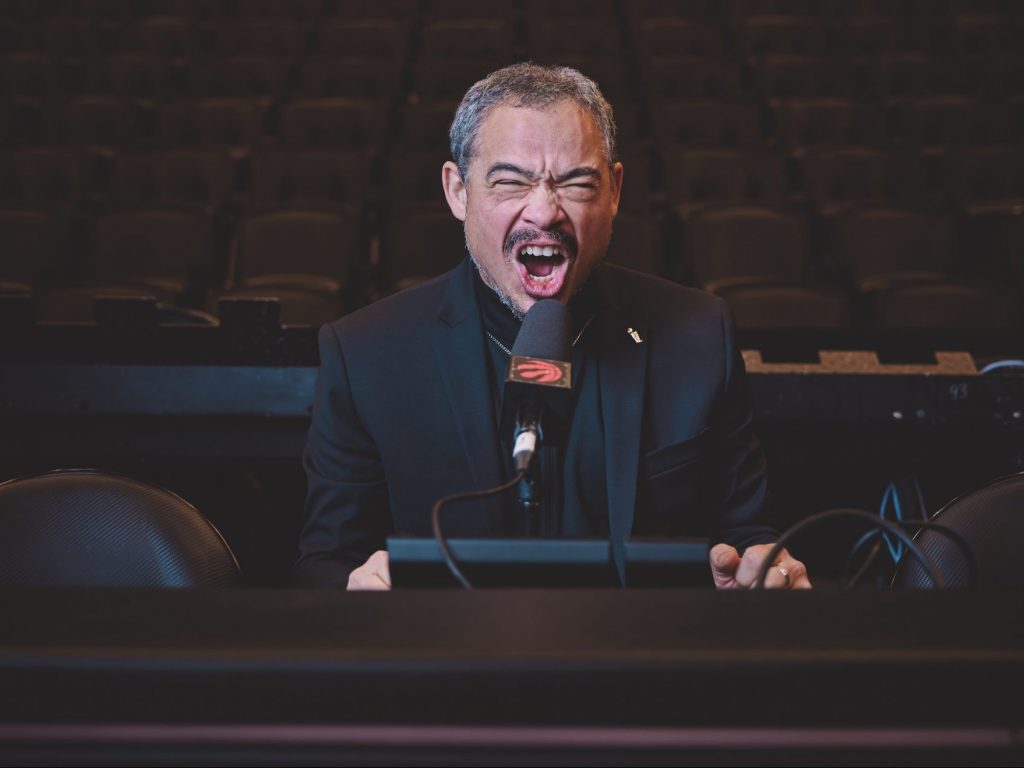
The pandemic has given evenings back to his family, allowing him to spend many consecutive nights with his wife, Stephanie, and their 15-year-old son, Enhle, whom they adopted in South Africa. Kuhn’s presence has been especially needed to support his parents as they manage geriatric health amid the pandemic’s lonely isolation.
With his mom and dad’s first vaccination shots recently booked and a return to the field looking more plausible every day, Kuhn is buzzing with positivity. But all of that will quickly change. Within minutes of ending our Zoom meeting, Stephanie will call her husband with news that tests the strength of his optimism and the depths of his hope.
The next time I hear from Kuhn is in an email explaining that his father has died of a suspected heart attack and his mother, suffering from a neurological disorder, is now in hospital. Six weeks later, I’ll hear from him again, this time expressing grief for his mom’s passing. “I lost both of my parents in a 47-day span,” he writes. “Pain. Lots of pain.”
Herbie Kuhn grew up an only child in Toronto’s Beaches neighbourhood, which he describes as a white working- class area at that time. His dad, Werner, was a mechanic from Germany, and his Guyanese mom, Patricia, who immigrated in 1963 as a domestic worker, was one of the only Black people around him. In a public school of over 1,000 students, Kuhn can remember few classmates of African descent, which is perhaps why he didn’t see himself as Black. He recognized the features of his maternal ancestors only when he stopped to look in the mirror or scrutinize himself in team photos relative to the other lacrosse, hockey and rugby players.
His Black identity wasn’t just obscured by being mixed race, but also by the fact that he was never made to feel like an outcast, at least not that he recalls. The stories his parents told him of being harassed in the streets as an interracial couple sounded like science fiction. Every now and then, though, Patricia tried to prepare him for the inevitable. “She would say, ‘People are not going to like you because you’re Black. You’ll have troubles in life because you’re Black. You won’t always get treated the same because you’re Black,’” recalls Kuhn.
The day would come when he’d understand, though not in Canada. It was during a summer vacation to Germany, when Kuhn, a teenager, was shoved out of an elevator by skinheads. It was around this time that Kuhn realized something else: he would never be a good enough goaltender for the National Hockey League. Years of fantasizing about standing between the pipes, stealing pucks before cheering fans, got channelled into a desire for admiration wherever he could find it.
A good kid trying desperately to be bad, Kuhn sought out his high school’s rockers’ clique, relishing the cheap rebelliousness of smoking weed, binge drinking and Black Sabbath. “I don’t think I’d ever even been drunk at that point,” says Kuhn, who’s most ashamed of the couple of times he drove home intoxicated. “I could have killed somebody.”
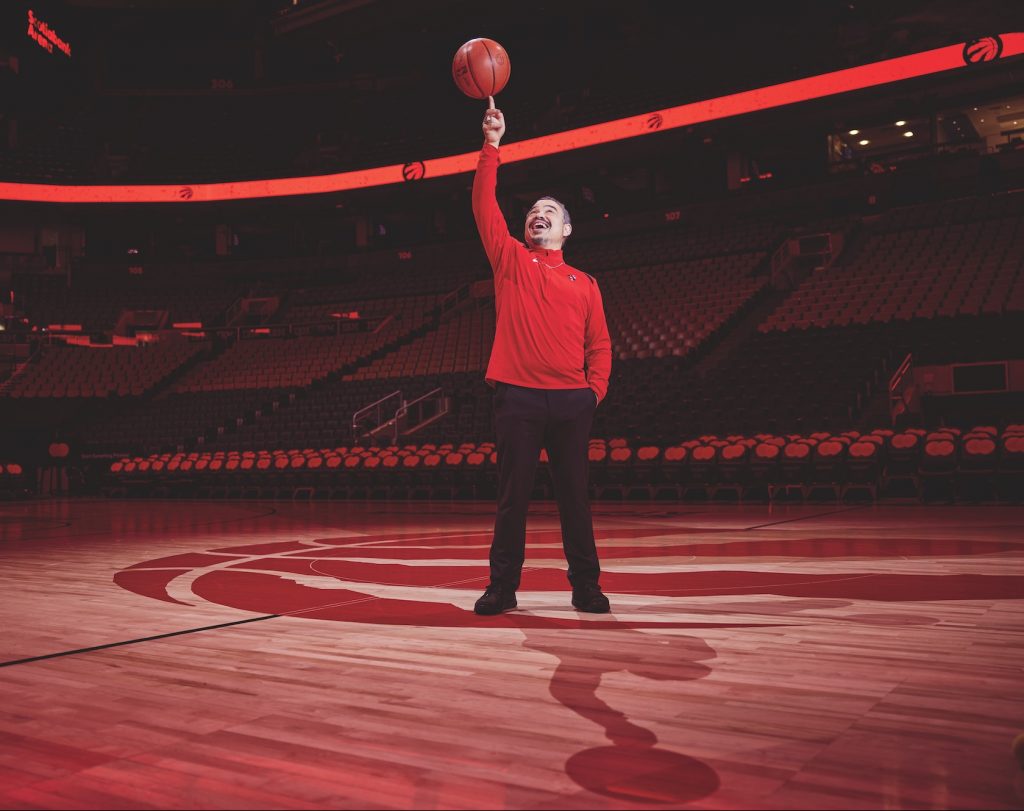
There was plenty more “unsavoury behaviour,” but unwilling to indulge me with the details, Kuhn leaves it at that. He’ll only say it was enough for his mom to spend many hours on her knees, praying for God to watch over him.
Kuhn doesn’t know what, if anything, he was rebelling against. He had friends and a great relationship with his parents and coaches. Looking back, he says part of what motivated him was an impulse to be part of the popular crowd. “We are all spiritual beings and woven into us is a desire to belong, to be loved,” he says. “And it’s when we pursue those cravings with the wrong means that it can lead to extremely negative outcomes.”
Not all of his outlets were unhealthy. Kuhn discovered a passion for acting in high school. He began a diploma in theatre arts performance at Humber College, but he quickly ran into conflicts with the program’s heads.
Kuhn cultivated a distrust of authority from his father, who grew up in Hitler’s Germany. Werner almost lost his dad to the Nazi regime. Kuhn doesn’t know the full story of why his opa was imprisoned, but thinks it may have been a punishment for helping Jewish people sneak across the Swiss border. “My dad would regularly tell me, ‘Think for yourself. Make sure you don’t buy what anyone else is telling you.’”
After friction with Humber leadership, Kuhn, depending on whom you ask, either dropped out or was kicked out following his first year. He was content to work at a grocery store with salary and benefits for a while until apathy wore off.
Deep down, he wanted a sports career, but he was a realist about his abilities, not to mention a regular smoker. However, there were other ways to immerse himself in sports.
Kuhn pursued a diploma in languages and literature at Vanier College in Montreal with the intention of applying to a university journalism program after graduation. Not only did he become sports editor of Vanier’s campus paper, but he was elected chair of the athletic council and appointed associate coach and team manager for the rugby team, which ultimately led to his biggest career breakthrough.
A sports public address announcer is a peculiar type of voice work. It is nothing like the PA announcer you might hear hosting an awards show. Aside from mandatory announcements, almost everything within the game itself is unscripted. You must memorize heaps of names, many foreign, and swiftly associate them with the correct jersey colour and number. It helps to possess a smooth and sonorous voice and a strong diaphragm and bladder, but you must also have exceptional stamina, focus and punctuality.
If it were just communicating the basic facts of a game on time from beginning to end, there would be no need for someone as charismatic as Kuhn — and going to games would be a lot less fun. What Kuhn and his contemporaries bring to the trade is personality, a quality evident in Kuhn’s catchphrases familiar to Raptors fans, such as “j-j-j-jam!” and “Your To-ron-to Rap-tors” (said with a ferocious roar).
His vocal flair caught the attention of the Vanier Cheetah’s football team during his first year in 1992, and soon he was announcing for both the football and basketball teams’ home games. Kuhn, still the “party guy,” began to re-evaluate his life choices. “My voice could be a ticket to larger things,” he says. “And I knew that if I kept using recreational drugs and if I kept waking up every morning and spending the first half-hour coughing, that would not be good for my voice.”
Kuhn didn’t believe then what he does now, that God gave him his voice to be utilized, but he nevertheless knew it was a gift he could lose. Halfway through his second year, he made a New Year’s resolution to quit drugs, but the very next day, on Jan. 1, 1994, he was at it again. “I remember being so absolutely, thoroughly disgusted at my lack of control to stick to a commitment I’d made.”
Shame was the impetus he needed, and he hasn’t touched a drug in 28 years and counting. “It’s amazing when you find your calling, how that can affect your life choices.”
The calling could not have come sooner. His A-plan, a journalism degree, crumbled one rejection letter at a time from each university he had applied to. “I’ll never forget receiving that third letter and literally breaking down in tears,” he says. “I was pissed, and I was actually mad at God. Like seriously, how could this happen? And it was with that kind of cloud over me that I begrudgingly returned to Toronto.”
Before moving in with his parents, Kuhn submitted an application, complete with an impressive VHS highlight reel, to announce games for the 1994 Adidas Questra soccer festival taking place in Montreal and Toronto. He landed the gig and did such a good job that he was hired to announce the FIBA World Championship in basketball organized in Toronto and Hamilton the same summer.
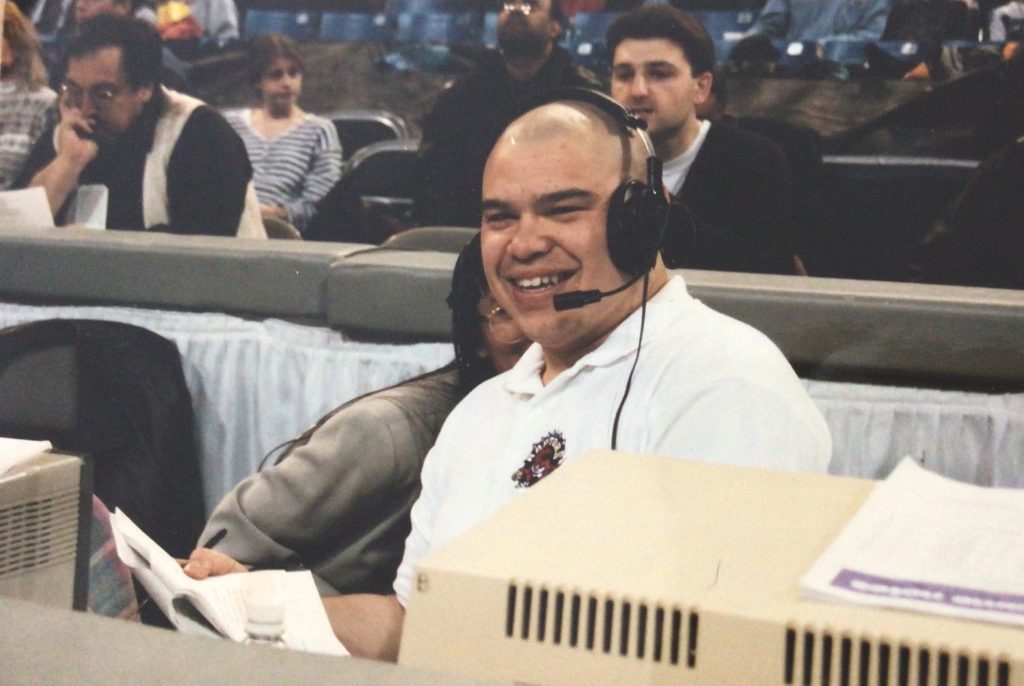
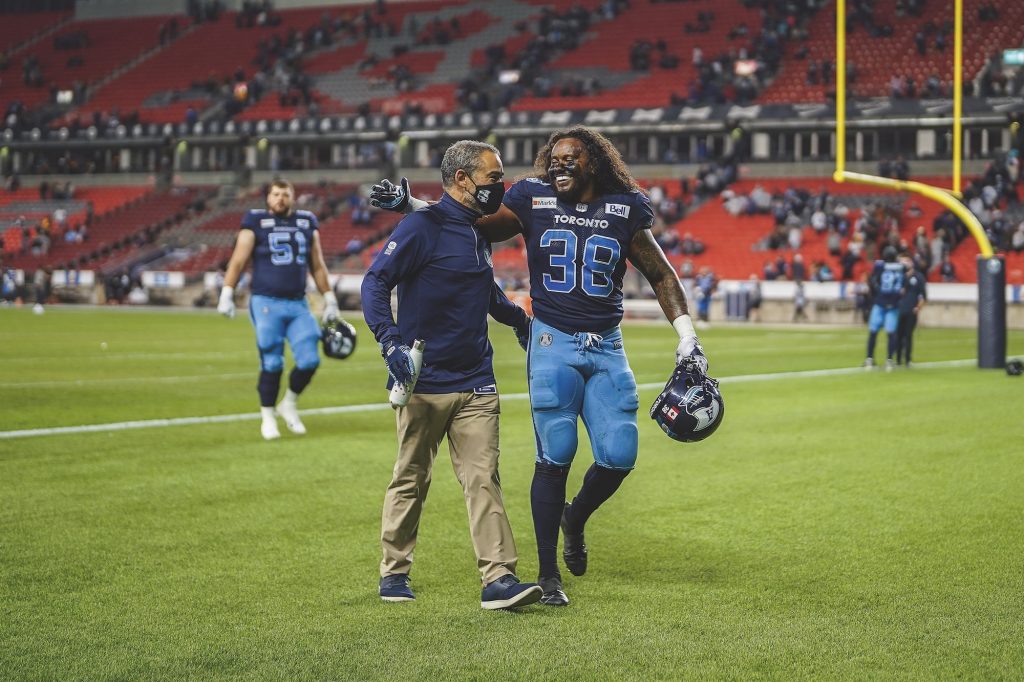
He surprised the FIBA hiring agent by requesting team rosters of all 16 countries competing in the tournament. Asked what for, Kuhn told him, “I want to make sure I get the names right. I need to research; I need to practise.” Rosters in hand, Kuhn took the Korean players list to his neighbourhood corner store. “I’m not leaving here until I can say these names as if I was from your country,” he told them. He took the Chinese list to a Chinese acquaintance and did the same.
It paid off on day one. After announcing his first pair of basketball matches at the tournament, he was immediately hired to replace another announcer fired that day. “Success,” Kuhn likes to say, “is when preparation meets opportunity.”
That’s an understatement for a most fortuitous period that also included the NBA’s Canadian expansion with the Raptors and Vancouver Grizzlies. The rookie PA talked to his Raptors contact, who happened to be the same guy who hired him for the FIBA World Championship.
“[The Raptors] went after somebody else, who declined it because they weren’t offering enough money. I was the second choice, and now I’ve been there for a quarter century. So, praise to God,” says Kuhn, who was 26 when he started calling out household names from a courtside table in October 1995: Magic Johnson, Shaquille O’Neal and M.J. himself.
Amid all his good fortune, though, was a spiritual crisis. On top of his new job with the Raptors, he’d also earned a gig as a writer and editor for the Roar, the official newspaper for the Hamilton Tiger-Cats. He felt that someone was looking out for him. But Kuhn was without a church since his mother, Patricia, parted with their United Church congregation.
He mentioned the situation to Steve Kearns, the Tiger-Cats chaplain and a former slotback. Kuhn had only attended team Bible studies a couple of times, more out of curiosity than any passion for scripture. But Kearns was willing to help.
Knowing Patricia was Guyanese and that she lived in the Beaches, Kearns suggested they visit a historically Black church near their house. “It’ll be different than what you’ve been accustomed to, but I think you should try it out,” Kearns told him.
One Sunday soon after, Kuhn attended Grant African Methodist Episcopal (AME) Church on his own. Though it was only a couple of kilometres north of his neighbourhood United church, Kuhn felt like he’d entered another country. Founded in Philadelphia during the emancipation movement, AME was like the movie version of a Black church, which was his only frame of reference for what he saw and heard.
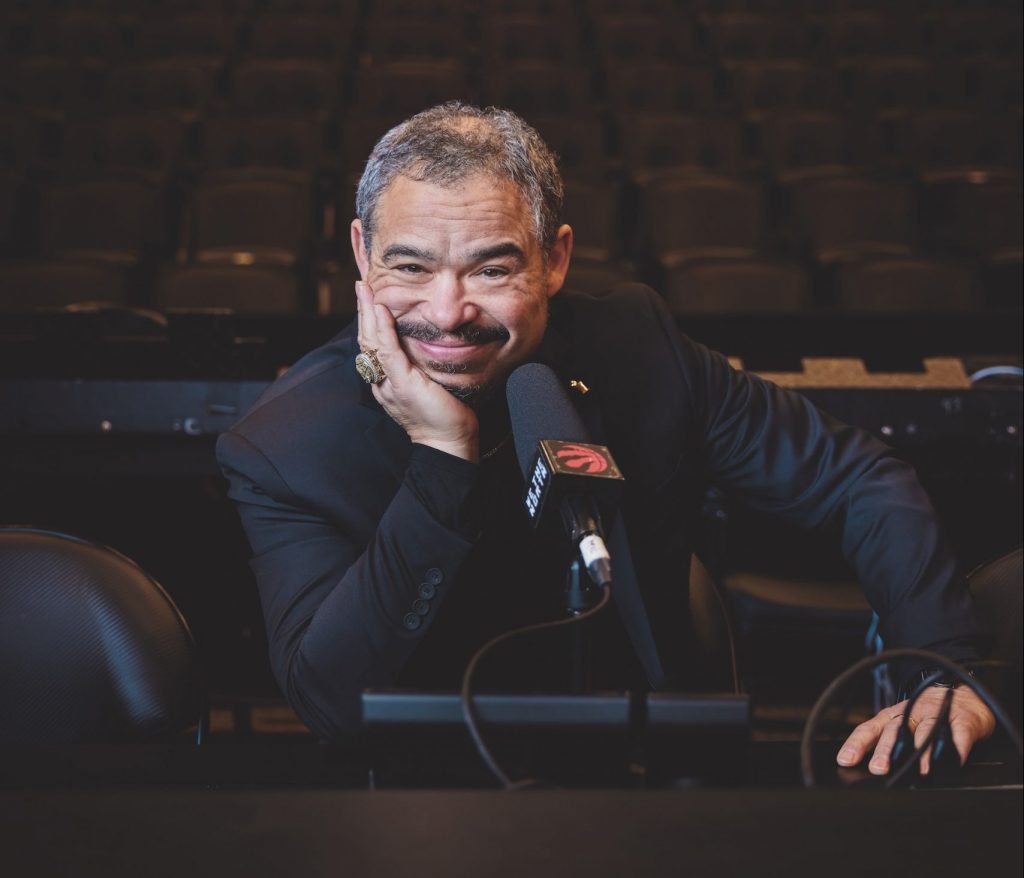
He recalls a bubbly woman greeting him at the doors: “Good morning, God bless you. It’s nice to have you worship with us.” It took him aback. Man, he thought, she’s in church and she actually looks like she wants to be here.
He sat in the rear, rattled by the sheer noise of this sanctuary. The choir entered from behind the chancel, swaying back and forth to live jazz music, singing “Glad to be in service.… You didn’t have to let me live, but I’m glad to be in service,” while 300 people stood up to rapturously clap and sing along. “I didn’t realize music like this existed in Toronto,” says Kuhn.
Unfamiliar with Black culture beyond sports and food, Kuhn was outside his element. He noticed a white woman in the choir — Stephanie Hancock, his future wife — and recognized another white guy as his dad’s colleague, but the rest of the congregation was Black. Then the pastor emerged with his cordless microphone and asked any newcomers to stand. Oh crap, thought Kuhn, highly conscious of his public persona. If there was ever a room in Toronto, outside of a stadium, where he’d be instantly recognized, it was this one with hundreds of Black folk.
The pastor wound his way to the back with the mic to get his name. “Nice to have you with us,” he said, before returning to the altar. His cover blown, Kuhn slunk down with a nervous grin thinking, I did not want this attention. And yet, it was what he needed.
Till this day, he’s not entirely sure why he kept returning without Patricia, who joined a nearby Baptist church instead. It wasn’t Stephanie; the two wouldn’t connect for another few months (though they’d later learn about a pair of fellow churchgoers conspiring to “pray them together”). It certainly wasn’t his comfort; Kuhn was stunned when, after two hours of worship, the boisterous congregation still wanted more, jumping to their feet and shouting praise. “I didn’t fully comprehend why it felt so liberating to me.”
The best explanation Kuhn can offer was that he felt compelled by the rhythm of Grant AME’s services. Many of the congregants were descendants of American refugees who escaped through Chatham and Windsor, Ont., and North Preston, N.S. “When you’re in a Black church, the roots of which come from Black slaves who escaped,” Kuhn explains during our meeting in April 2021, “and they’re singing about being free and about being set free…” He shuts his eyes and drifts off with a long sigh. “They’re talking about actual freedom, being able to vote, being able to live, being able to earn a living without persecution.”
Reflecting on the sense of belonging he felt at the church, Kuhn thinks he has realized something else about his voice: that this gift, with its natural resonance and powerful acoustics, was given to him by a maternal ancestor. He feels a sense of responsibility as he ponders this unique strain of DNA being kidnapped from West Africa, sold to British slavers in Guyana and preserved through generations of hardship. “I’m going to make sure I use this natural gift that I’ve been blessed with. That’s one way that I can honour those who came before me.”
After a months-long stretch of quiet, the next time I see Kuhn is through a video feed from a funeral home in east Toronto. Only 15 people are allowed to physically attend the celebration of his parents’ lives; everyone else has to join virtually. But it’s the largest in-person audience Kuhn has addressed in almost 18 months.
He tells us that he has the “painful privilege” of eulogizing his role models, a renegade individualist and a compassionate extrovert. His composure wavers, especially when memorializing Patricia, “a rock to many, including me,” but he only goes off script once, to sing the praises of her curried shrimp and roti, before he and his uncle place his parents’ ashes inside a niche. Kuhn stays there, back turned, to have a good cry, and returns to centre frame after he’s gathered himself.
Taking a deep breath, he begins to ponder the mysteries of devotion, becoming more animated as he preaches God’s ability to transform prayers for his parents into actual strength for him and his family. “Because of your love, your prayers, your generosity, your provisions, your acts of love and kindness,” says Kuhn, his body moving in rhythm with his speech, “we stand here and say, ‘Praise God and thank you.’ That is a mystery. I don’t know how He does it, but He does it.”
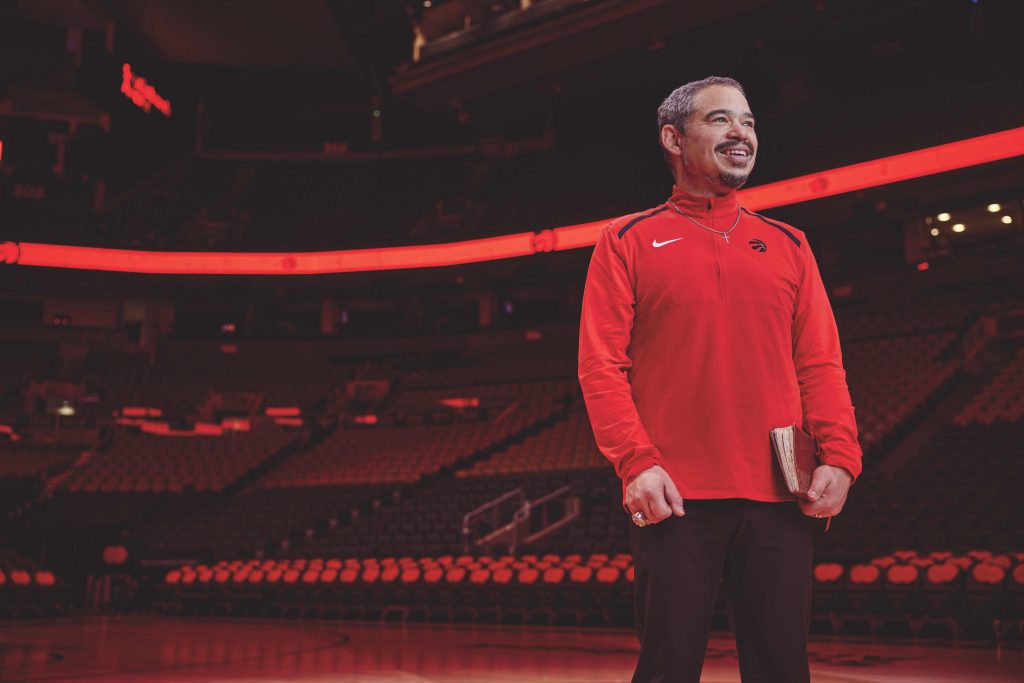
“And that,” he adds, “is the kind of prayer that my mom taught me to pray.”
Until this moment, I’d only heard Kuhn in private conversations or live on TSN. But this is how athletes hear him in between games, as someone empowered with his biblical knowledge yet vulnerable with his sincerity. It’s most remarkable considering his grassroots education. Kuhn never went to Bible college or studied theology, never was ordained. He merely studied at the feet of Steve Kearns, who is more amazed than anyone by Kuhn’s transformation.
Thinking back to early discipleship meetings, Kearns recalls wondering, “Is he even getting any of this?” Gradually, he realized that what inspired Kuhn wasn’t reading the word of God but hearing it and seeing it in action, helping somebody. That became apparent when Kearns started as the Raptors chaplain in 1996. Kuhn served as his informal apprentice, eventually becoming co-chaplain, which is how they work together to this day. “He’s the preacher, and I’m the teacher,” says Kearns of their distinct styles. “He wears his emotions all the time.”
Kuhn has begun to find his bearings in late July 2021 when we finally reconnect on Zoom. Sitting in a shady corner of his yard, surrounded by chirping birds, he says he has plenty to be thankful for. Nobody was there for Werner’s last moments, but his mom died peacefully in Herbie and Stephanie’s home, which they had begun renovating for Patricia’s hopeful recovery.
“You and I are acutely aware of how many people have not been able to be there with their loved one in those final moments,” he says about hospital restrictions throughout the pandemic. “So even though I was dreaming that we’d be able to get her into a wheelchair and take her out to the garden…I have not lost sight for a split second that we had 12 days with her in our home, loving her, caring for her, doing everything we needed to make her as comfortable as possible. That’s a gift from God.”
Running has become a bigger part of Kuhn’s life, no longer just a method for fitness but for healing and maintaining the capacity to put one foot quite literally in front of the other. Throughout his personal calamity, Kuhn has continued his running streak, even on two of the most difficult days of his life. He just completed another half-marathon run with a picture of his parents folded in his pocket. “Anytime I felt discouraged or slowed down, I just tapped my pocket and kept on going.”
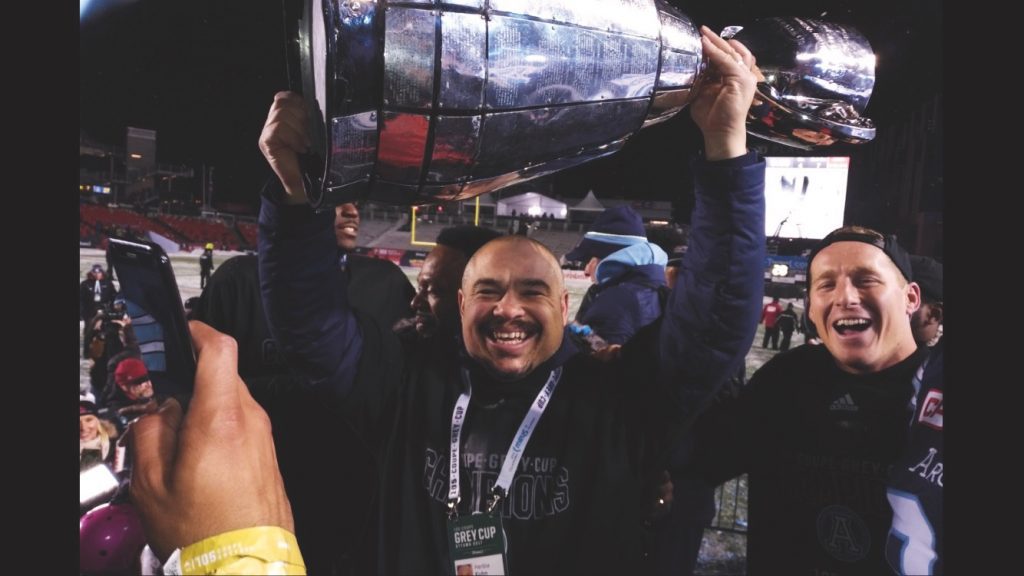
Perhaps most of all, he was thankful to know that he’d be back on the field and the court, as the CFL returned from hiatus and the Raptors came back home for the 2021-22 season. Two days prior, he held his first post-pandemic chapel for the Argos during training camp, to a team he barely recognized. About three-quarters of the 2019 roster were lost to trades, retirements or free agency, a combination of the pandemic and two poor seasons that led the owners to re-evaluate the team from general manager down.
Kuhn selected John 15:5 for that first chapel: “I am the vine, you are the branches. If I remain in you, and you remain in me, you will bear much fruit. But apart from me, you can do nothing.” It’s classic sports ministry scripture, a humbling verse he first shared with Raptors players back when Vince Carter and Kuhn himself, as chaplain, were rookies. He has shared it with many Argos since becoming their team chaplain in 2010.
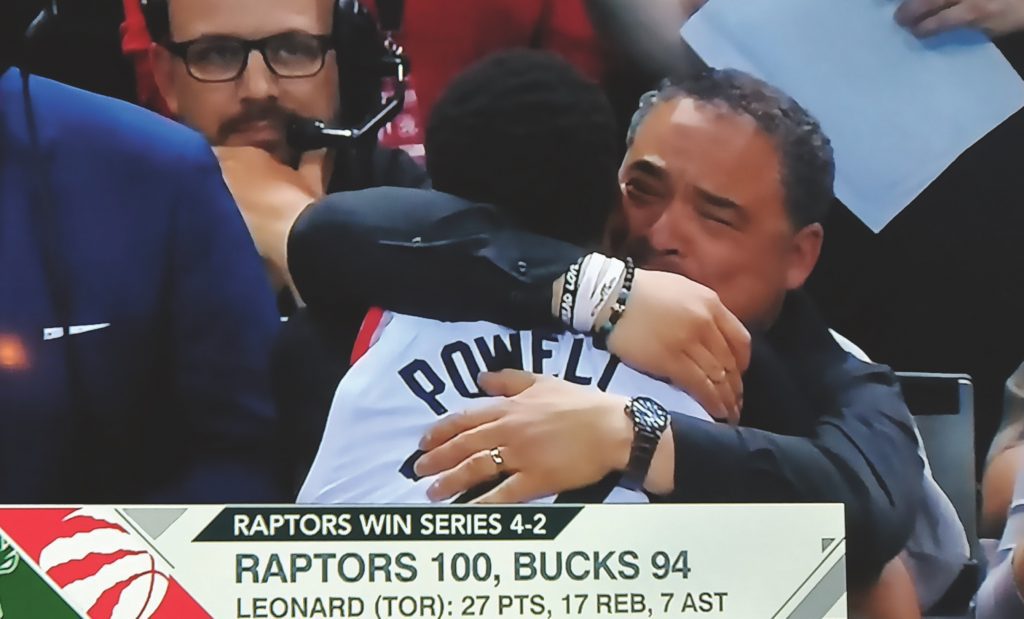
“The opportunity to play an integral role in the development of a young man’s life, from his rookie season onwards, is a unique and distinct blessing and privilege,” reflects Kuhn. One such man is star quarterback Trevor Harris, who played his first four CFL seasons with the Argos. He considers Kuhn a friend and mentor. “He was always there for me in times [I was] struggling,” he says.
Harris, a Christian from rural Ohio, was called up to the Argos from the American Arena Football League in 2012, but he had not benefited from a team chaplain until then. He credits Kuhn with helping him to frame adversity as an opportunity for growth, and to stay away from the typical vices — women and money.
It’s hard for players to remain themselves when they’re constantly on the road, away from family, surrounded by dozens of their peers from different walks of life, all of whom grew up accustomed to “being the man.”
“I appreciate that about him,” says Harris of Kuhn’s teaching. “It wasn’t about just giving us things that our ears want to hear, but things that our spirits and souls need to hear.”
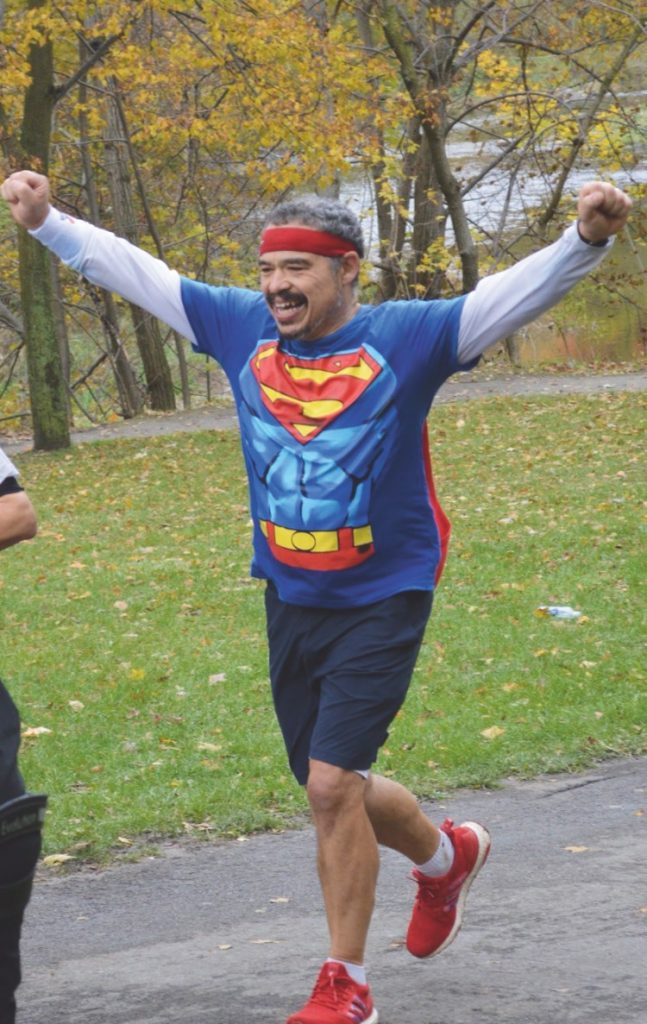
What Harris appreciates most is Kuhn’s ability to listen to players. Kuhn likes to ask questions as often as he offers answers. It comes back to the concept of “spiritual fitness.” Unlike physical, mental and social fitness, this is one that athletes must define for themselves. “Teams could have anybody from multiple different belief systems or some people who don’t even believe anything,” explains Kuhn. The question he asks is “What does spiritual fitness look like to you?”
It comes down to this, Kuhn continues: “What do you fall [back] on when everything else crumbles apart; when mentally, you are struggling; when socially, your friends have bailed on you because you’re no longer the guy giving them free tickets; and when physically, you’ve had a career- or season-ending in-jury and you’ve been cut?”
Deep inside every athlete is a desire to contribute. It’s so entangled with their internal worth that it can take much less than “getting cut” to crush their spirits. But the realization that their talents have eroded — whether through age, injury, being made third-stringer or not being called up to roster one week — is as inevitable as a receding hairline. “I hope that whatever you articulate as spiritual fitness is going to be there to carry you,” Kuhn says.
What carries Herbie Kuhn is the certainty that God is always working behind the scenes to turn personal battles into blessings, and never has he needed to believe in this more.
“I want that to be the fulcrum that everything rotates around,” he says. “Whether I’ve lost my voice and I have to announce the next night, whether I have just had one of the best days in my life, or whether both of my parents have died within 47 days, whether there’s enough money in the bank account to plan a vacation or barely enough for specials on the grocery shelf, I have peace and that’s irreplaceable.”
This story first appeared in Broadview’s March 2022 issue.
Omar Mouallem is an author and filmmaker in Edmonton.

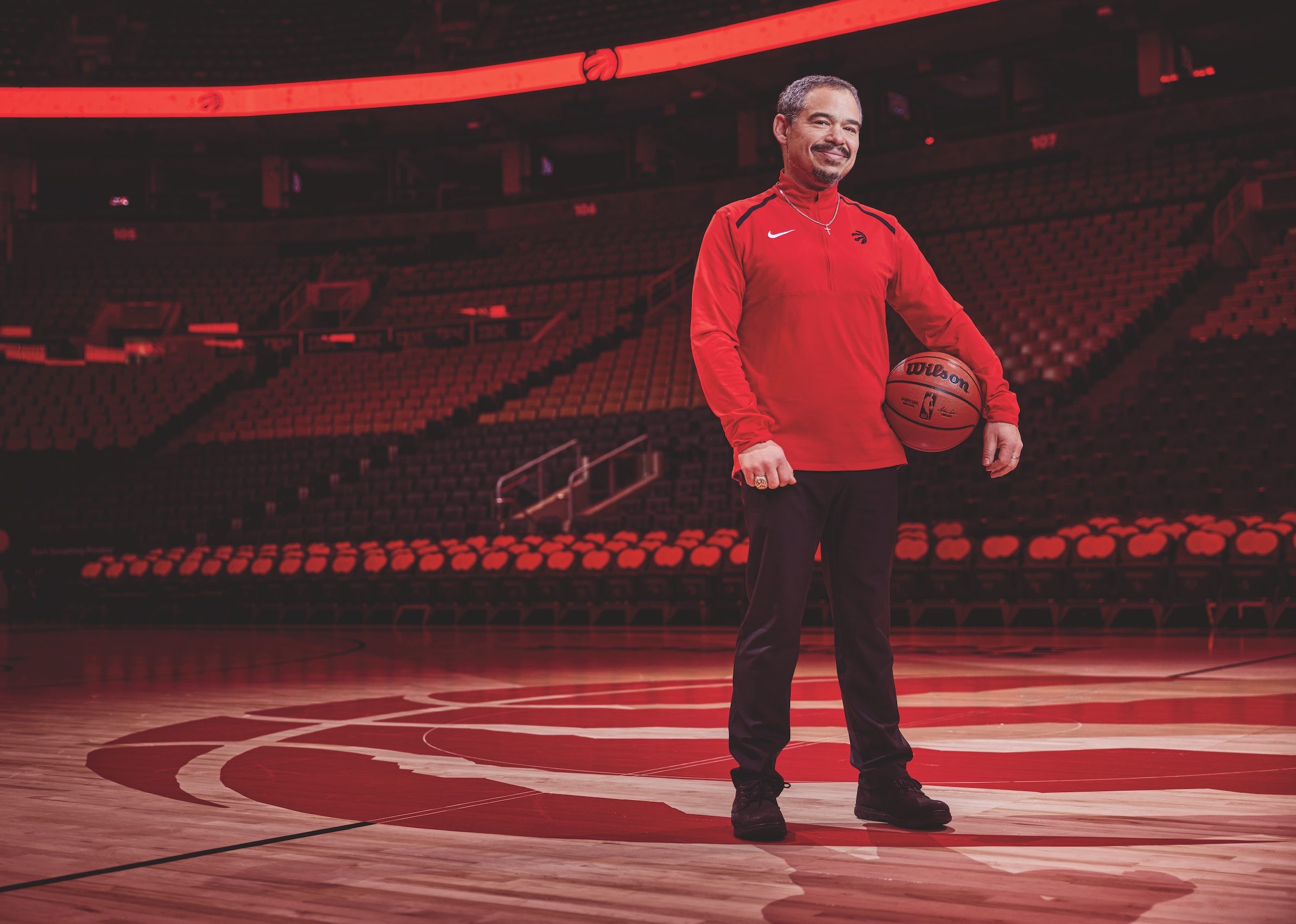









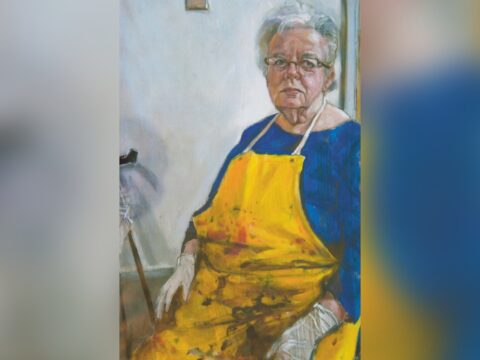
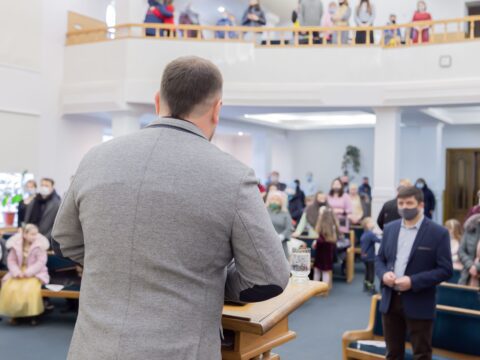
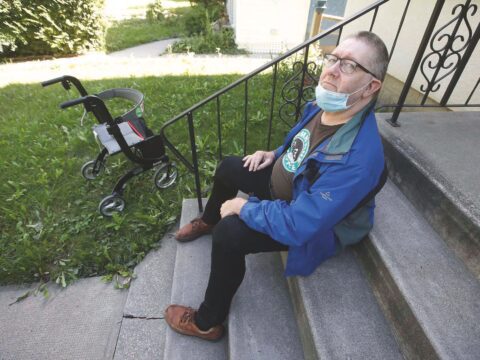
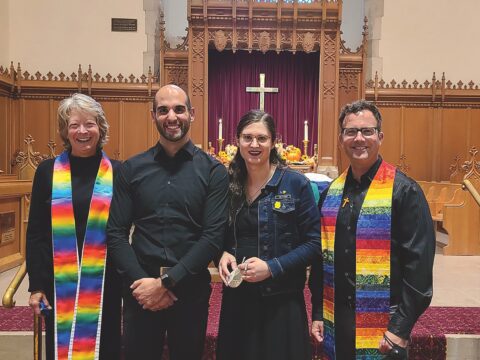
Herbie Kuhn may be Canada’s best known Chaplain, although I’ve never heard of him.
If you want to open a debate about Canada’s most famous chaplain, my vote would go to Hon. Capt. John Foote, VC who won his medal under fire on the beach at Dieppe in 1942.
It is unfortunate that Canadians know so little of their history and sports themed stories are so full of rhetoric that this type of hyperbole is the norm!
Dear Mr Kuhn,
I’m grateful I had the chance to read your story & that you were willing to tell it.
Sports, especially professional, is so hard on its players. If one is not the best & first 100% of the time, one is not good enough. Second place, you hardly get a mention. Living a life with peace in your heart, that’s the best goal ever. May you & your family be richly blessed.
Perhaps at some point in Mr Harris’ life he will learn that women are not a vice.
P.S. I love the pic of you & your mother. She is beautiful.
Thank you Herbie Kuhn, for being bold enough to share your journey and faith. Thank you for acknowledging The Lord’s guidance in our everyday lives. Too many of us take all the credit for our own successes and don’t realize that The Lord has worked wonders in our lives.
(Romans 8:28 (NIV) And we know that in all things God works for the good of those who love him, who have been called according to his purpose.)
I pray that your story will be a blessing to many and that many will be able to see/read it. Thank you to Broadview.org for sharing your story for others to see. Lord’s continued blessings…